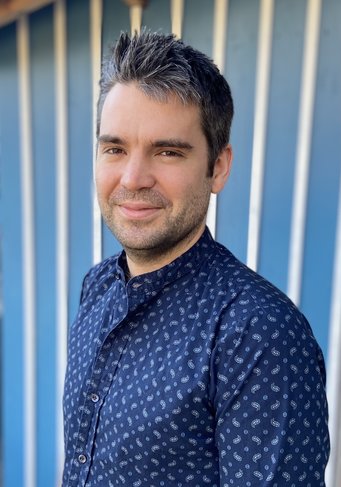New department will investigate long-term interactions between land use change and urbanisation and their relevance for human-Earth system relationships
The Max Planck Institute of Geoanthropology (MPI-GEA) is pleased to announce that Dr. Patrick Roberts will join its board of directors, heading the new Department of Coevolution of Land Use and Urbanisation, effective 1 January 2025. Patrick Roberts has been leader of the isoTROPIC independent research group and lead scientist of the Department of Archaeology at MPI-GEA since 2022.
"We are very excited to have Patrick Roberts, an outstanding archaeological scientist, as our third director at the MPI-GEA. Together, we seek to disentangle the complexity of human-Earth system interactions from the deep past into the future - his innovative approaches combining social and natural science methodologies will contribute significantly to our institute's mission," says Prof. Ricarda Winkelmann, founding director at MPI-GEA.

Dr. Patrick Roberts
"Since the foundation of the institute we have been developing jointly with Patrick Roberts the vision of geoanthropology as a transformative science that helps us to cope with the challenges of the Anthropocene by learning from the past and also from experiences of non-Western cultures. Patrick's ability to combine insights into the co-evolutionary nature of the human-Earth system with a deep understanding of regional transformation processes will play a key role in realizing this vision," says Prof. Jürgen Renn, founding director at MPI-GEA.
Roberts' research applies a variety of methodologies to study interactions between humans and the Earth system, including archaeology, biochemistry, palaeoecology, remote sensing, history, and land cover modelling. In 2021 he became the first archaeologist to receive the Heinz Maier-Leibnitz Prize, the top award for early career investigators in Germany. Roberts was also awarded the Thuringian Research Prize for top performance in basic research by the Thuringian Ministry of Economy, Science and the Digital Society in 2024.
At the MPI-GEA, Roberts' department will study the long-term interaction between cities, land use, and the Earth system, combining archaeology's unparalleled ability to document long-term material outcomes of urban processes with history, palaeoenvironmental reconstruction, and urban science. A large focus will be on building new quantitative and qualitative datasets, and analyzing them using the latest computational approaches, to compare past urban patterns, land use tendencies and, critically, their alternatives.
"Understanding the co-evolution of urbanisation and land use will undoubtedly be critical to our future on this planet," says Roberts, "and I look forward to collaborating closely with the other departments at MPI-GEA, as well as interdisciplinary colleagues around the world, to explore this process on different temporal and spatial scales."
The MPI-GEA was founded in 2022 to study the past, present, and future of our species' interactions with the Earth system. Land use change is one of the most tangible expressions of this relationship. Indeed, global intensification of land use is argued to be a key component of life in the Anthropocene and the 'Great Acceleration' of human-Earth system interactions. Urbanisation is a particularly significant form of land use, given that two-thirds of the human population will live in cities by 2050.
"Studying urban histories through multidisciplinary approaches can stimulate new ideas, perspectives, and help policy makers to discern fundamental urban and land use tendencies from contextually specific traits. It can also help us to identify 'missed opportunities' which may have disappeared in the face of industrial and colonial ideologies and forces," concludes Roberts.






